#spiro agnew
Text
Vice Presidents as vines bc why not
#mostly the living ones#dan quayle#al gore#dick cheney#joe biden#mike pence#kamala harris#but also#Spiro agnew#Luca makes compilations
14 notes
·
View notes
Text

AGNEW: (verb) To bounce back into your face.
-- MAD magazine, 1978
There's something genuinely ironic about Spiro Agnew, the vice president to the formerly most corrupt president, having a boardgame about American history.
In 1968, Richard M. Nixon selected Agnew to be his vice presidential running mate. Agnew quickly developed a reputation for strong polemical speeches critical of the antiwar movement, the media, and liberals. On October 10, 1973, after pleading “no contest” to a charge of income tax evasion connected with kickbacks he received during his tenure as Maryland’s governor, Agnew resigned as Vice President – only the second vice president ever to resign and the first to leave office because of legal problems. Agnew was disbarred in 1974.
The game out in 1971, two years before the shit hit the fan.
10 notes
·
View notes
Note
sticking to pre-2000: why were incompetent oafs, e.g. Agnew, chosen for the tail of the ticket?
Agnew was a top-notch hatchet man who was perfectly willing to attack anybody and blow every dog whistle, so he came in handy during the 1968 campaign and early years of the Nixon Administration. He actually was quite popular with Nixon supporters. Nixon also recognized that, comparatively, Agnew made him look like a statesman. Nixon and his top aides saw Vice President Agnew as impeachment insurance -- even if Nixon screwed up, they realized that Congress had no interest in seeing Agnew assume the Presidency.
Unfortunately for Nixon, Agnew was a literal criminal, so when the Vice President was indicted and facing potential prison time there was no way for him to remain in the Administration and he had to resign. So, when Nixon did screw up, he no longer had his impeachment insurance and instead had a Vice President (Gerald Ford) who was practically universally respected in Washington.
Not all Vice Presidents before 2000 were "incompetent oafs", but the job sucked until the last half of the 20th Century when Presidents started giving VPs some real responsibilities within their Administrations. Most of the VPs after World War II have been respected politicians with extensive experience in government. The exceptions, in my opinion, would be Agnew (even though he was Governor of Maryland, it was only for two years) and Dan Quayle (who had served in both the House and Senate but was considered a joke even when he was first nominated for VP in 1988). But the Vice Presidency has been a more influential position over the last 50 years, so present-day VPs usually aren't stiffs who have no relationship with the President they serving under. In the past, Vice Presidential nominees were frequently chosen to help balance the ticket regionally or ideologically, or to placate certain wings of the respective political parties. Fortunately, recent VP nominees are thoroughly vetted and usually chosen because they are seen as being fully capable of assuming the Presidency at a moment's notice, if necessary. Of course, there are still recent exceptions to that rule, as well.
#History#Presidents#Presidency#Vice Presidents#Vice Presidency#Presidential Elections#Presidential Politics#Presidential Campaigns#Politics#Elections#Vice Presidential nominees#Spiro Agnew#Vice President Agnew#Richard Nixon#President Nixon#Nixon Administration#Resignation of Spiro Agnew
24 notes
·
View notes
Text
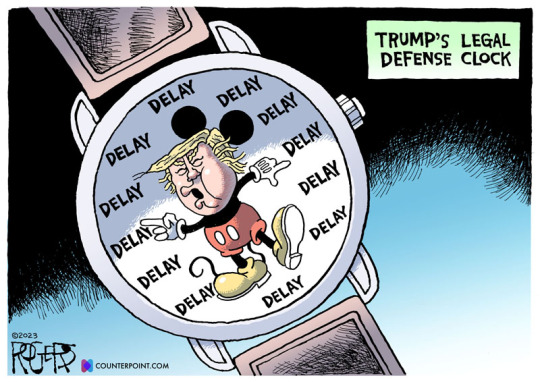
#spiro agnew#lock him up#released on a technicality#liar liar pants on fire#putins bitch#treason is the reason
10 notes
·
View notes
Text
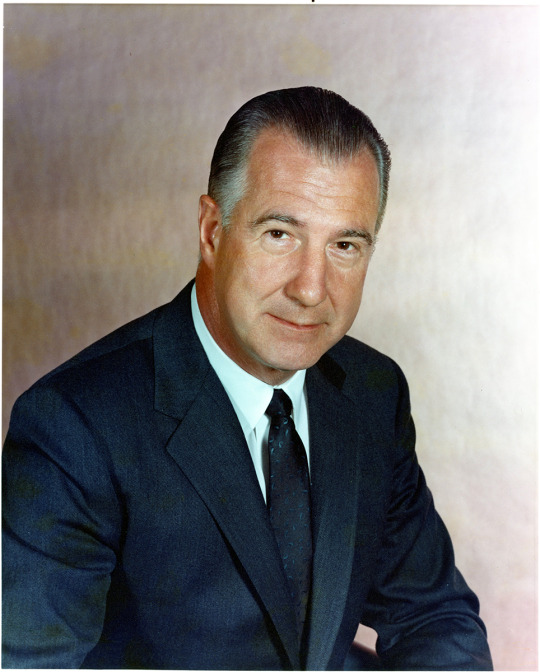
#Nixon50 #OTD 10/10/1973 Vice President Spiro T. Agnew resigned from office. He was the second United States Vice President to resign. His resignation came as part of a plea deal reached with the Department of Justice in which he received no prison time for a plea of no contest to one felony count of tax evasion. (Image: WHPO-2509-01)
6 notes
·
View notes
Text

#who would win in a fite#polls#spiro agnew#data star trek#Star Trek#the political showdown no one was expecting#us politicians
17 notes
·
View notes
Text
The 1972 failure...?
Okay guys here's how McGovern can still win
#george mcgovern#ted kennedy#edmund muskie#hubert humphrey#george wallace#Scoop Jackson#gay rights#1970s#1972#politics#spiro agnew#richard nixon#president
2 notes
·
View notes
Photo
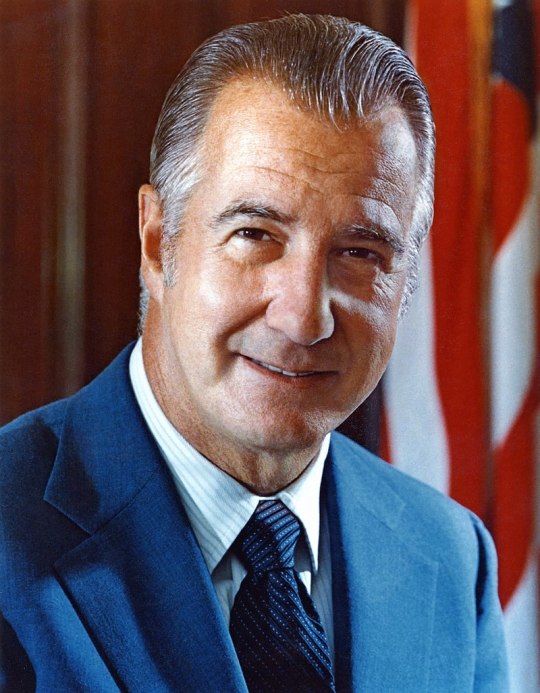



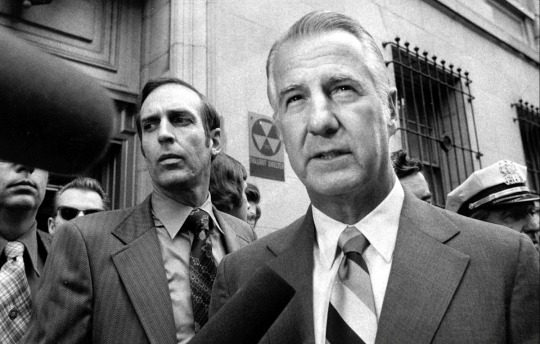

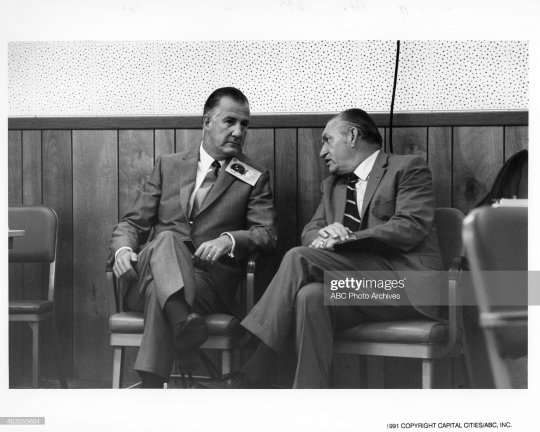


Spiro T. Agnew (November 9, 1918 – September 17, 1996)
Physique: Average Build
Height: 6' 2" (1.88 m)
Spiro Theodore "Ted" Agnew was the 39th vice president of the United States, serving from 1969 until his resignation in 1973 in connection with accusations of extortion, bribery, and income-tax violations relating chiefly to his tenure as governor of Maryland. He is the second vice president to resign the position, the other being John C. Calhoun in 1832. After months of maintaining his innocence, Agnew pleaded no contest to a single felony charge of tax evasion and resigned from office. Nixon replaced him with House Republican leader Gerald Ford. Agnew spent the remainder of his life quietly, rarely making public appearances. He wrote a novel and a memoir; both defended his actions. Agnew died at his home of undiagnosed acute leukemia.
Once the second most powerful man in the country, brought himself down, and was sent into obscurity more rapid than his unlikely ascent. Tall and handsome, Agnew looked like he had the potential to be a good if not great fuck.
28 notes
·
View notes
Text

The Spiro Agnew Mural
31 notes
·
View notes
Text
#Jeb is the only one of these I would actually consider naming any of my kids#newt gingrich#mitt romney#jeb bush#rand paul#spiro agnew
7 notes
·
View notes
Note
What's the weirdest presidential history book you have?
I have a book called "Go Quietly....Or Else" by disgraced former Vice President Spiro Agnew.
First of all, it's dedicated to Frank Sinatra, and I know that Agnew and Sinatra were close friends and that Sinatra loaned Agnew money to help cover his legal bills, but it's still kind of random when that's the first thing you see when you open up the book.
But what makes the book weird isn't even the fact that Agnew uses it to claim that he was totally innocent of the charges of bribery, extortion, and tax evasion that forced him to resign as Richard Nixon's Vice President and cut a plea bargain with federal prosecutors to keep from going to prison. No, the craziest part of the book, is Agnew's allegation that -- apparently on President Nixon's behalf -- White House Chief of Staff Alexander Haig strongly urged Agnew to resign and heavily implied that if he didn't, he would be killed.
In the book, Agnew writes that his military aide, General Mike Dunn:
(T)old me that General Haig also reminded him about the great power of the Presidency, saying, "The President has a lot of power -- don't forget that."
His remark sent a chill through my body. I interpreted it as an innuendo that anything could happen to me, I might have a convenient "accident." What had Haig meant when he said "anything may be in the offing"?
I was close enough to the Presidency to know that the office could exert tremendous power. I had attended secret sessions of the National Security Council and knew something about the functioning of the intelligence community. I knew that men in the White House, professing to speak for the President, could order the CIA to carry out missions that were very unhealthy for people who were considered enemies. Since the revelations have come out about the CIA's attempts to assassinate Fidel Castro and other foreign leaders, I realize even more than before that I might have been in great danger. Haig's words to Dunn that after indictment "anything may be in the offing" could only be construed as an open-ended threat.
I did not know what might happen to me. But I don't mind admitting I was frightened. This directive was aimed at me like a gun at my head. That is the only way I can describe it. I was told, "Go quietly -- or else."
I feared for my life. If a decision had been made to eliminate me -- through an automobile accident, a fake suicide, or whatever -- the order would not have been traced back to the White House any more than the "get Castro" orders were ever traced to their source.
To further illustrate how much danger he was in at the hands of Alexander Haig, Agnew also claimed that in the final year of Nixon's Presidency, Nixon "did not actually administer all the powers of the Presidency" and that "it was General Haig who was the de facto President."
It's really a pretty weird-ass book, especially one written by a former Vice President of the United States. Unsurprisingly, nobody believed Agnew about his supposed innocence (including one of his former lawyers) or that Haig had threatened to eliminate him if he didn't resign (including the military aide that Agnew said Haig had made the implied threat to). Maybe Frank Sinatra believed him.
#Books#Spiro Agnew#Vice President Agnew#Vice Presidency#Resignation of Spiro Agnew#Presidency#Presidential Scandals#Politics#Political Scandals#Go Quietly...Or Else#Frank Sinatra#Richard Nixon#President Nixon#Nixon Administration#Alexander Haig
23 notes
·
View notes
Text


Spiro Agnew clock available on Redbubble!
#irlsimpsons#spiro agnew#political cartoon#the simpsons#simpsons items#simpsons merch#obscure simpsons#simpsons stuff#simpsons#clock
1 note
·
View note
Text
Frost/Nixon Interviews: The Second Term
As far as messing around with other people’s elections, that is something that the United States shouldn’t be involved with. If that kind of thing happened here and you could make a strong case that it did in 1996 with President Bill Clinton’s reelection from the People’s Republic of China, we would be freaking out in America over that and did. Congress actually investigated that election both in…
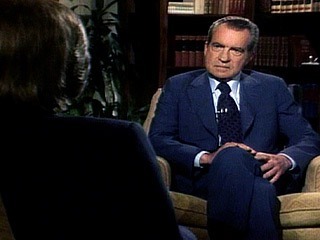
View On WordPress
#America#Augusto Pinochet#Britain#California#Center Right#Chille#England#Frost/Nixon#Frost/Nixon Interviews#PBS#President Nixon&039;s Final Days#President Nixon&039;s Second Term#Richard Nixon Administration#Richard Nixon Presidency#Richard Nixon White House#Salvador Allende#Spiro Agnew#The 1970s#United Kingdom#United States#Washington#Washington DC#Watergate
0 notes

